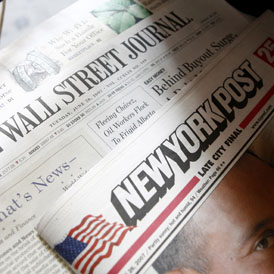Phone-hacking scandal, the American view
The phone-hacking scandal has been painted as a very British picture of journalism by the US press, even by Murdoch-owned organisations. And that’s the way he wants it, writes Felicity Spector.

The closure of the News of the World was front page news in America’s leading papers – the New York Times and the Washington Post.
But even though Rupert Murdoch‘s giant News Corp has major holdings in the United States – from Fox television to the Wall Street Journal (WSJ), it’s all been depicted as a very British scandal – with little impact beyond the liberal chattering classes.
As far as the US is concerned, there’s a certain schadenfreude – perhaps about the fate of such a well-known tabloid – but what matters in Wall Street is purely profit.
Rupert Murdoch’s biographer Michael Wolff told Channel 4 News “anything is now possible” in this crisis, on both sides of the Atlantic.
He said: “This scandal’s been going on in the UK for almost five years, with very little interest to people in the US.
For everyone there is this immediate sense that something incredibly grave has happened here. Michael Wolff
“For people in the US this scandal literally started last week, so there’s a lot of catching up to do, a lot of people trying to understand what’s going on.
“For everyone, for shareholders, for people in the media, for people on the News Corp board of directors, for other executives within the company, there is this immediate sense that something incredibly grave has happened here – so [there is] a rush to understand it, to figure it out and to assess the implications for News Corp in the US, the business and for the family.”
Back when Rupert Murdoch took over the WSJ – an investment banker told the New York Times: “Capitalism is built on the highest and best use of capital and [Murdoch] understands that. Money has no conscience.”
And columnist Joe Nocera unearthed a memo from the WSJ editor Robert Thompson to reporters saying they’d “henceforth be judged not on their ability to report deep, thoughtful stories – long being The Journal’s strength – but on whether they regularly broke news, even by a matter of “a few seconds,” for the Dow Jones Newswires.
“How those stories are obtained has never been of much concern to him. In Murdoch’s mind, at least, it’s still life or death,” Nocera added.

It is still implied, though, that the rather more heinous practices of the British red-tops are far removed from journalistic ethics in the States.
One reason, perhaps, is the greater power of advertising. Ads account for some 70-80 per cent of newspaper revenues in the US, far higher than in Britain.
According to Tom Rosenstiel, director of the Pew Research Centre project for excellence in journalism, “there is a tradition of the American press that is more serious. That tradition has been encouraged by advertisers. They are paying for space that is credible and respectable.”
Although even here, Newsweek points out that the Murdoch-owned New York Post is no slouch when it comes to sensationalism: “Page Six, emblematic in its carelessness about accuracy or truth or context – but oh-so-readable – became the model for the gossipisation of an American press previously resistant to even considering publishing its like.”
More serious, though, is any potential legal action which News Corp could face.
There is a tradition of the American press that is more serious. That tradition has been encouraged by advertisers. They are paying for space that is credible and respectable. Tom Rosenstiel
James Murdoch is set to return to New York by the end of this year to play a larger and more powerful company role. Even if there’s no evidence linking him to any payments by staff to corrupt police officers, the Guardian has been speculating that the US authorities could still take action.
America’s Foreign Corrupt Practices Act bans companies registered in the US from bribing foreign officials to obtain or retain business. That could potentially subject News Corp to a Department of Justice investigation: hefty legal fees and in a process that could drag on for years.
For Murdoch – there’s far more at stake than a tabloid newspaper or even a (possibly temporary) slide in share prices. His media outlets Stateside wield an incredible amount of commercial power – and a political influence it’s taken decades to build.
Fox News, with its “fair and balanced” slogan has tried seamlessly to merge the most strident opinions with actual news reporting. It has won millions of viewers, consolidating the grip of the Murdoch influence-machine across the land.
More from Channel 4 News: Britain's Watergate? Mea Culpa!
Now, though, in the wake of the scandal that’s already being compared to Watergate – his all-powerful global empire is being assaulted on all sides: battered on the stock exchange, threatened by even stricter regulation, or a whole world of potential legal action.
Whatever the outcome, though, American commentators are certain of one thing: the enduring commercial clout of tabloid news. Gossip makes money, sells papers, wins ratings. And that legacy of the Murdoch empire, at the very least, is here to stay.
-
Latest news
-
As India goes to the polls in the world’s largest election – what do British-Indians think?6m

-
Tees Valley: Meet the candidates in one of the biggest contests coming up in May’s local elections4m

-
Keir Starmer says public sector reform will be a struggle7m

-
Nicola Sturgeon’s husband Peter Murrell charged with embezzlement of funds from SNP1m

-
Ukraine might finally get $60billion in American weapons and assistance to defend against Russia3m

-




